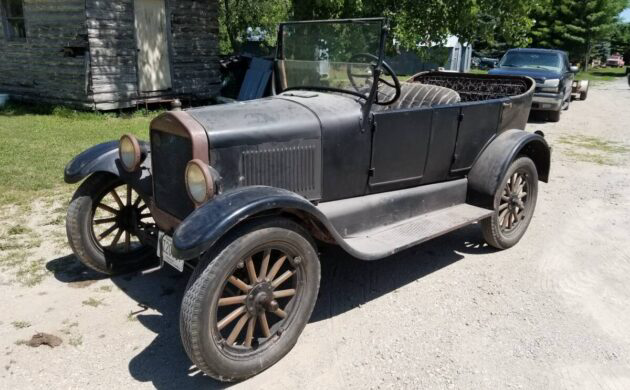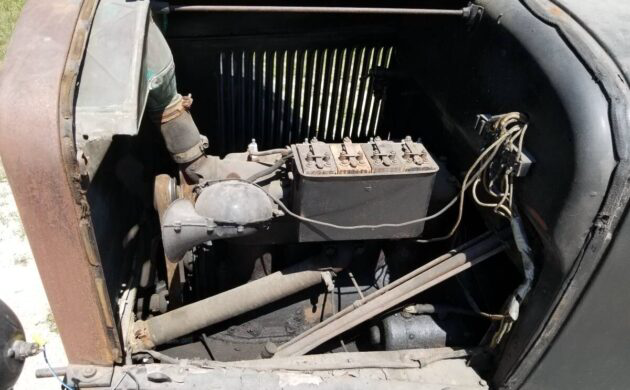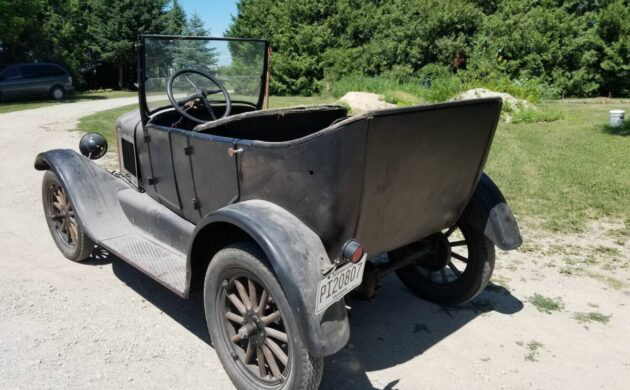Survivor! 1926 Ford Model T Touring
The legacy of the Ford Model T is difficult to overstate. This is the car that helped put the world on wheels – the kind of wheels without a horse in front. Sure, cars other than the Model T were around, but they were expensive. Henry Ford’s mission was to put a car in every drive, and that meant mass production. Contrary to popular myth, Ford did not invent the assembly line. In fact, Venetians used a form of the assembly line in the twelfth century, when ships were moved down canals to be fitted with specialized parts made by craftsmen at separate stations. As mass production developed, it led to interchangeable parts, then the use of unskilled labor, then standardized manufacturing equipment. Ransom E. Olds actually invented and patented the assembly line, with the first “mass-produced” car being the Curved Dash. Henry Ford’s contribution to the process was compelling the assembly line to move by conveyor. This innovation meant that starting in December of 1913, one Model T could be built every ninety minutes, shattering production records. In 1913, 170,000 Model T’s were made, priced at $525. In 1923, Ford made over 2 million Model T’s, and the price was just $364. Here on craigslist is one of these wonders, a 1926 Model T Tourer, with an asking price of $5,900. The car is in Rochester, Minnesota. Thanks to T.J. for the tip!
Propulsion was via a 177 cu. in. inline four-cylinder flathead motor. This little guy produced about 20 bhp. The top speed was 45 mph. Most unusual was the transmission, which utilized planetary gears – these are found in virtually every automatic transmission we use today. The gear controls consisted of three pedals and a lever mounted on the roadside of the floor next to the driver. The throttle is on the steering wheel. The seller indicates the car starts readily and runs and drives well.
This car is in great rustic condition. But the interior presents a conundrum. The seat material may be original, and if so, should be preserved. However, it’s truly about to disintegrate – with bits of material literally missing. A seat cover might preserve what’s left, or bite the bullet and renew the seat entirely. Then, of course, the seat is going to stand out like a sore thumb as the only new part of the car.
This is the touring body, seating four. The seller indicates that the top needs restoration – another potentially conspicuous new part! Alternatively, use a seat cover and forget the top – just drive it when it’s not raining. About that color: was black the only choice? Yes and no. Before the conveyor belt assembly line, Model T’s could be had in several colors. But after 1913, black was it. Black dried faster and was cheaper to produce, promoting the whole mass production theme. If you can’t tell, I love this car. I think it’s cheap at twice the price.
Auctions Ending Soon
 2002 Subaru Impreza WRXBid Now22 hours$333
2002 Subaru Impreza WRXBid Now22 hours$333
 1975 Chevrolet Corvette ConvertibleBid Now23 hours$4,000
1975 Chevrolet Corvette ConvertibleBid Now23 hours$4,000
 1964 Ford F-100 Camper CustomBid Now1 days$2,000
1964 Ford F-100 Camper CustomBid Now1 days$2,000
 2006 Jeep Wrangler SportBid Now2 days$11,000
2006 Jeep Wrangler SportBid Now2 days$11,000
 1974 Datsun 260ZBid Now4 days$750
1974 Datsun 260ZBid Now4 days$750





Comments
Good write up Michelle. As for the seats, if you want to carry more than two people, driver included, folks delegated to the back seat area aren’t going to be thrilled sitting on the seat springs. There has to be a time when originality should take a back seat to functionality, so to speak, and the seats should be rebuilt. Amazing condition for it’s age.
Colors were (re)introduced on closed cars in 1926, but the Tourer (being an open car) remained available “only in black.” All 1927 cars were in colors – black was a special order color that year!
Forgot to mention that you should check out Darlene Dorgan’s “Silver Streak,” a 1926 Tourer that she took on a number of long cross-country road trips with as many as five (six total!) of her girl friends. Farthest trip was from Bradford, IL to San Francisco. This in the late 1930s, when single girls traveling unescorted was looked down upon. https://gypsycoeds.com
I had a 27 touring that I put on a shortened Ford Courier pickup chassis. Had a built little 4 banger and I switched to a 5 speed. That was my high school car. It was fenderless and it handled like it was on rails. Took every girl in the school for a ride in that thing lol.
What does the “T” stand for in the Model T?
Asking price is spot on and this should find a home. With some seat covers (a bit more in the back) it can be used as is to putter around. Making it prettier won’t make it any better or reliable. Driven carefully, it could be used for years. Doesn’t say if it has a electric start, which would be nice for year round driving.as hand cranking a cold one is difficult. Asking more would put it into Model A territory, which is a much improved car. I really like this car, 29 years ago I would have jumped on this, but my tinkering with 100 year old car phase has passed.
I used to work for Avery Greene in Vallejo, Ca. Avery’s grandfather, Clarence W. Avery is in the Automotive Hall of Fame. He led the development of the moving assembly line for Ford Motor Company in 1913, reducing the production time of the Model T by 78 percent, and changing the automotive manufacturing process forever.
I can see Laurel and Hardy in this beauty!